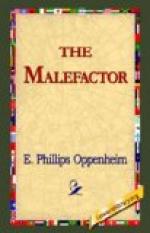Then Lovell broke silence. He took his pipe from his mouth, and he addressed Aynesworth.
“Walter,” he said, “you are talking rot. There is nothing very complex or stimulating about the passion of war, when men kill one another unseen; where you feel the sting in your heart which comes from God knows where, and you crumple up, with never a chance to have a go at the chap who has potted you from the trenches, or behind a rock, a thousand yards off. Mine is going to be, except from a spectacular point of view, a very barren sort of year, compared with what yours might be if the fire once touched your eyes. I go where life is cruder and fiercer, perhaps, but you remain in the very city of tragedies.”
Aynesworth laughed, as he lit a fresh cigarette.
“City of tragedies!” he exclaimed. “It sounds all right, but it’s bunkum all the same. Show me where they lie, Lovell, old chap. Tell me where to stir the waters.”
Several of those who were watching him noticed a sudden change in Lovell’s face. The good humor and bonhomie called up by this last evening amongst his old friends had disappeared. His face had fallen into graver lines, his eyes seemed fixed with a curious introspective steadiness on a huge calendar which hung from the wall. When at last he turned towards Aynesworth, his tone was almost solemn.
“Some of them don’t lie so very far from the surface, Walter,” he said. “There is one”—he took out his watch—“there is one which, if you like, I will tell you about. I have just ten minutes.”
“Good!”
“Go ahead, Lovell, old chap!”
“Have a drink first!”
He held out his hand. They were all silent. He stood up amongst them, by far the tallest man there, with his back to the chimney piece, and his eyes still lingering about that calendar.
“Thirteen years ago,” he said, “two young men—call them by their Christian names, Wingrave and Lumley—shared a somewhat extensive hunting box in Leicestershire. They were both of good family, well off, and fairly popular, Lumley the more so perhaps. He represented the ordinary type of young Englishman, with a stronger dash than usual of selfishness. Wingrave stood for other things. He was reticent and impenetrable. People called him mysterious.”
Lovell paused for a moment to refill his pipe. The sudden light upon his face, as he struck a match, seemed to bring into vivid prominence something there, indescribable in words, yet which affected his hearers equally with the low gravity of his speech. The man himself was feeling the tragedy of the story he told.
“They seemed,” he continued, “always to get on well together, until they fell in love with the same woman. Her name we will say was Ruth. She was the wife of the Master of Hounds with whom they hunted. If I had the story-writing gifts of Aynesworth here, I would try to describe her. As I haven’t, I will simply give you a crude idea of what she seemed like to me.




